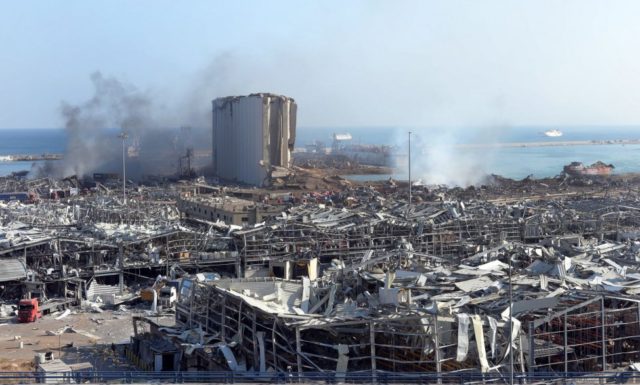BEIRUT, Lebanon, Feb. 25 (UPI) — The removal of a judge who charged four senior politicians with negligence in the Beirut port explosion has raised fears of “political interference” and prompted renewed calls for an international investigation.
The dismissal of investigative Judge Fadi Sawan by the court of cassation on Feb. 18 was seen as a major setback to efforts to determine what caused the massive Aug. 4 blast and who is to blame for the 2,750 tons of ammonium nitrate stored there for seven years before igniting.
Some 209 people were killed, more than 6,000 were wounded and entire neighborhoods were destroyed in the explosion, the worst non-nuclear blast in history.
Sawan, who had arrested about 25 people and charged 41 others in the blast probe, was criticized for conducting a slow investigation and focusing more on negligence and recklessness by low- to mid-level port, customs and security officials.
Among those charged were caretaker Prime Minister Hassan Diab, former Finance Minister Ali Hassan Khalil and two former public works ministers, Ghazi Zeaiter and Youssef Fenianos.
Diab, who resigned Aug. 10 amid mounting political pressure and popular anger, and President Michel Aoun received security reports and were aware of the presence of large quantities of ammonium nitrate at the port as early as July.
“It is unfair to say that Judge Sawan was investigating only one side of the case and neglected the others,” a source at the Justice Palace told UPI on the condition of anonymity. “It is true that he considered and chased the slightest negligence that led to this big catastrophe, but he was also investigating how the ammonium nitrate arrived in Beirut, who took some of the explosive material and the trucks that transported them outside the port.”
A separate investigation by the Lebanese Army and the FBI estimated the amount of ammonium nitrate that exploded at the port was 500 to 600 tons, raising questions about what happened to the remaining 2,150 to 2,250 tons that were initially stored there.
Sawan sought the help of Interpol to issue arrest warrants for the Russian captain and owner of the Rhosus ship that brought the explosive material in 2013, but Moscow refused to hand them over.
The judge also repeatedly contacted French investigators, who were probing the death of two French nationals in the blast, to get their final report.
“The French report is the essential foundation because French experts took samples from the port scene and that will determine whether there are explosive materials other than the ammonium nitrate, if any trace of a missile or a bomb,” the judicial source said.
But Sawan crossed the “red lines” when he charged the four senior officials in December. “He knew he was running great risks and dared doing that,” the source said.
The officials refused to be questioned as suspects. Khalil and Zeaiter argued that they enjoy immunity as members of parliament and filed a request with the court of cassation to remove Sawan from the case. The court said Sawan cannot be neutral because his house was damaged in the blast.
Sawan was also following a lead reported by the local New TV station linking three Russian-Syrian businessmen, who have been sanctioned by Washington for ties to the regime of Syrian President Bashar al-Assad, to a London shelf company. Savaro Ltd was used to ship the ammonium nitrate to Beirut in 2013.
Sawan ordered Lebanese security services to gather information about the businessmen, the judicial source said.
Georges Jreij, former head of the Beirut Bar Association who represents the survivors of several blast victims, including the secretary-general of the Phalange (Kataeb) political party Nizar Najarian who was killed in the blast, described the court decision to remove Sawan from the case as “a political favor.”
“Its timing was very suspicious,” Jreij told UPI, citing among others a call last month by Hezbollah chief Hassan Nasrallah to release the results of the investigation even though it hadn’t been completed.
Although he expressed satisfaction over the way Sawan was conducting the investigation “despite all the pressures,” Jreij warned against considering the port explosion as “a car accident” and limiting it to negligence and recklessness.
“We insist that it is an organized crime,” Jreij said, adding that the Phalange Party in September demanded the United Nations establish a regional center for the International Court of Justice in Beirut to follow up on the port investigation.
Parliamentarians from the Christian Lebanese Forces this week called on U.N. Secretary-General António Guterres to form an international fact-finding mission.
“This is not going to happen overnight…Any international investigation needs first a decision by the Lebanese council of ministers,” Jreij said.
Sawan was quickly replaced by Tarek Bitar, a 46-year-old judge who heads Beirut’s criminal court and who was described as qualified and competent, with no political affiliations.
Families of the blast victims, who have been demonstrating for justice since the explosion, are willing to give Bitar two weeks to review the case.
“We cannot judge him now…He will have to prove that he is serious and willing to go to the end,” said William Noun, whose brother, a firefighter, was killed in the blast. “They know we are serious…If we feel at any moment that they will try to cover up the facts, we will be back in the streets and go to the politicians’ houses.”
Noun, who was in near daily contact with Sawan, said the judge never mentioned he wanted to quit the investigation and believes there was “political interference by the de facto forces.”
“We just want the truth,” Noun said. “But if we lose hope with the Lebanese justice, we will surely want an international investigation.”

COMMENTS
Please let us know if you're having issues with commenting.